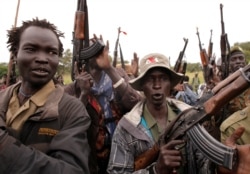South Sudan's government has continued to smuggle in weapons despite a United Nations ban, according to a new Amnesty International report. The rights group is calling on the U.N. Security Council to renew the arms embargo it imposed on the world's youngest country nearly two years ago.
Even though hundreds of small arms were being used by soldiers before the embargo went into effect, "several bodyguards for prominent generals from government and opposition forces alike, who would have first access to newly acquired weapons, carried models of eastern European weapons never before documented in the country," according to the report released Thursday.
Brian Castner, a New York-based weapons investigator with Amnesty, said his team recently visited a dozen military cantonment sites for government and opposition forces around South Sudan and saw the weapons in plain view.
"Some of the bodyguards of generals and high-level officials, those bodyguards were carrying Kalashnikov rifles of a style and a particular country that had not been seen in South Sudan before compared to the other datasets available. These weapons from Romania and former eastern Germany had not been seen in South Sudan before," Castner told VOA's South Sudan in Focus.
Amnesty investigators say they also found evidence of Chinese-made ammunition fired at a national security base outside the capital, Juba, and evidence the government bought spare parts for attack helicopters.
"These helicopters were broken at the start of the embargo so any maintenance and acquisition of parts of these helicopters would constitute a violation of the embargo," Castner told VOA.
South Sudan's President Salva Kiir and rebel leader-turned Vice President Riek Machar agreed to a new power-sharing government in February after more than a year of difficult negotiations. The country's revitalized 2018 peace agreement ended a five-and- a-half-year civil war that left more than 300,000 people dead.
Colonel Lam Paul Gabriel, deputy military spokesman for the former rebel SPLA-in-Opposition, said the SPLA-IO never had a deal with any foreign dealers to import arms.
"We never had any agreement with any country to supply us with guns, not even including the government and any foreign government. What we do, our movement, the SPLA-IO has basically survived and defended itself by the weapons from the community and what we get from the front lines," Gabriel told South Sudan in Focus.
Government and military leaders preferred not to comment, according to army spokesman Major General Lul Ruai Koang.
"The decision that was taken by the leadership is not to respond to all the allegations contained in that report," Koang told South Sudan in Focus.
Renewing the embargo at a time when South Sudan's peace partners are making progress is undesirable, said Gabriel.
"Calling for the country to be sanctioned again or the arms embargo to still stand is like the international community or this Amnesty International wanting South Sudan to go back into political crisis again or insecurity to intensify," Gabriel told VOA.
The arms embargo, established in July 2018, expires at the end of May when the Security Council is scheduled to vote on whether to renew it.
Carol Van Dam contributed to this report.





